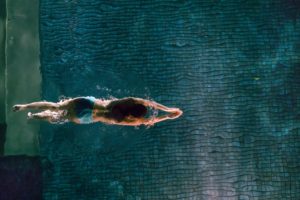When inspiration struck and I set out to build a new website for my blog and other writing, I assumed the process would move quickly. I could hardly wait to see the vision in my head become reality. I’m a happy and motivated independent learner and felt certain I could fumble with the design software and master it without much trouble, the way I did when I created Our Daily Crime.
The software for Our Daily Crime is nearly ten years old now, a tech dinosaur. The new software requires a whole new level of skill.
I needed help. Scheduling a meeting with a professional took time. Then we had to reschedule due to a conflict. More time. I turned my attention to other things and practiced patience (not very successfully!).
In the meantime, we’ve hired a new team member at work to join us in lifeguarding, teaching, and working with patrons and patients in the pools. He’s older than I am, and he’s working hard on refining his swimming skills and learning new techniques. We’re giving him all the support and practice we can.
I admire adults who want to learn new skills. We’ve just begun to teach private swim lessons again after the pandemic, and I have two adult students. When I asked one of them what her goals were for her lessons, she said, “Not to drown,” which made me laugh.
I did eventually meet with my web designer using Zoom, and I spent an intense hour and a half taking notes, asking questions, and watching her use the design software. Since then, I’ve spent several hours working with it, and gradually I’m gaining mastery and shaping the website I dreamed of. I’m elated. Can’t wait to share it with you!
As a lifelong learner and teacher, I notice how varied our learning experience can be.
Context matters. I was wretched during my public school years. My goals were to achieve good grades to meet the expectations of my family and graduate. Any pleasure in the learning itself, for its own sake, suffocated under the long nightmare of those years. Graduation meant nothing to me, and I would have ignored it if I’d been allowed. My reward was surviving.
College was no better. I didn’t want to be there. I didn’t belong there. Once again, I went through the motions of pleasing others and living up to expectations, two hellish years of depression, social isolation, and suicidal ideation before I dropped out.
I still wince when I think of the money wasted.
Somehow the joy of learning has been distorted into competition, capitalism, and perfectionism. Everyone doesn’t have equal access to education and educational tools. Many people don’t complete high school, let alone higher education. We don’t talk about education in terms of enhancing our lives and making ourselves bigger. We talk about getting a good job, making a lot of money (or not), and school loans. Capitalism defines success.
Worst of all, if we happen to be interested in literature, writing, religion, music, theater, philosophy – liberal arts, in other words – we’re steered away from those interests because “they” say we can’t earn a living pursuing them. I’ve got news for you. You can’t make a living as a librarian or medical transcriptionist, either.
Apparently, education is not valuable unless it leads to making a certain amount of money.
On the other hand, many learners in our communities are in it for the fun of learning something new. Their goals are about real life, as opposed to the construct of consumerism. They don’t want to drown. They want to do a job they’ve never done before and so learn new skills. They want to use technology as a tool to support their passion. Adult learners know learning enhances life. They’re not coerced into learning; they seek it out.
It’s a lot easier and more fun to teach someone who wants to learn than it is someone who’s having learning thrust upon them.
Adult learners have lived long enough to know how to learn. Not how to compete, how to cheat, how to work the system, how to manipulate good grades and references, and how to create their own personal perfectionistic demons, but how to learn. Adult learners also know something about how they best learn, and are able to communicate their needs and goals.
Learning requires time, patience and practice. It takes courage to seek new skills. It’s messy. We make mistakes, flounder, and fail. Good adult learners persist anyway, pursuing their creativity or passion, satisfying their curiosity and desire for mastery.
I’ve had the good fortune to know and work with wonderful teachers who have inspired, encouraged, and challenged me. I’ve also known destructive teachers who permanently damaged my trust, confidence, and sense of self-worth. The difference between them, I’m convinced, has nothing to do with their level of education or training, but rather with their power management. Good teachers seek to empower their students. Destructive teachers not only refuse to share their power, they actively disempower their students.
Healthy communities support learning and teaching, not necessarily as a formal process, but as a natural one. As a teacher, I know my students give me at least as much as I give them. Teaching and learning are collaborative, a sharing of power. To teach is to learn. To learn is to teach. Passing on my love of swimming doesn’t change the world, but it’s a contribution I can make joyfully.
Everyone succeeds when we teach and learn together.
© 2021 – 2023, Jenny Rose. All rights reserved.



